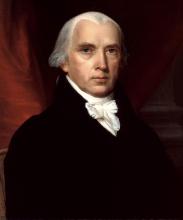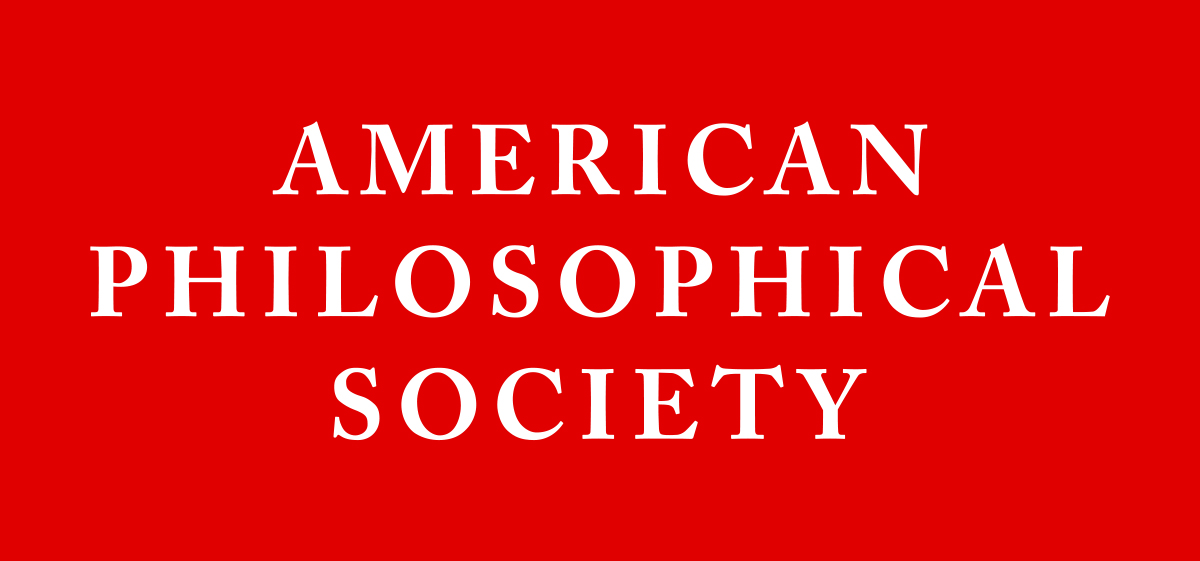James Madison (457)
Election date: 1785 
James Madison (5 March 1751–18 June 1836) was a statesman, slaveholder, fourth President of the United States, and a member of the American Philosophical Society, elected in 1785. Born to a prominent slaveholding planter family in Orange County, Virginia, Madison spent his early years preparing to be an upstanding member of the Virginia gentry and pursued an education thusly. He attended a boarding school in King and Queen County (1762-1767), and then received private at-home education for two years before entering Princeton College in New Jersey, a hotbed of revolutionary sentiment at the time (1769). He completed his three-year program in only two but remained in New Jersey due to failing health. His weakened state, however, did not stop Madison from reading law, theology, and Hebrew under the direction of Princeton College president John Witherspoon.
Returning to the family plantation in 1772, Madison tutored his younger siblings until the Coercive Acts of 1774 called him to action. Thereafter he trained with the militia and joined his father on the local Committee of Safety. When the war broke out, Madison’s still-tenuous health prevented active military service, so he fought on the legislative front: he entered the State Convention in 1776, promoted religious reform alongside Thomas Jefferson, pioneered the concept of religious equality from outdated “toleration” laws, and joined the executive Council of State.
Two years later, the Virginia Legislature selected him as a delegate to the Continental Congress (1780-1783), where Madison built the reputation that shaped his future. After retiring from Congress, he returned to the Virginia House of Delegates. His workload, however, did anything but decrease as the newly United States struggled to function as a unified nation. A tax and debt squabble that metastasized into an armed attempt to overthrow the government of Massachusetts—Shays’s Rebellion (1786)—terrified Madison: the peril made it clear that the Articles of Confederation of 1777 were incapable of meeting post-Revolutionary War realities; a group of delegates met in Annapolis in 1786 and determined the Articles needed serious revision.
Madison called for a convention of delegates from the various states to amend the Articles, but it became immediately clear he aimed to effect an entirely new form of government: the Constitution born out of the Constitutional Convention of 1787. During that sweltering summer and a stone’s throw from the APS the delegates met at Independence Hall, site of the Declaration’s signing. Madison there forged himself into the “Father of the Constitution”: he arrived with a plan-in-hand as one of the Atlantic world’s great political readers and thinkers. The majority of the Delegates were or became APS Members.
Madison, with Alexander Hamilton (APS 1791) and John Jay (APS 1780) won over New York (and probably Virginia) through a series of newspaper essays now collectively known as The Federalist Papers. Madison took the lead in the first Federal Congress (1789) and, as he promised Virginians like George Mason, penned the basis of the Bill of Rights (ratified 1791).
Ever a defender of republicanism, Madison began to doubt his Federalist allies—fearing their anti-democratic and potentially monarchical sentiments—fracturing his relationship with both Washington’s and Adams’s governments. Alarmed by Alexander Hamilton’s ambitious national bank project, Madison teamed up with Thomas Jefferson (APS 1780) to oppose the encroaching authoritarianism of the Federalists, both from within Congress and through the media with the National Gazette. The conflict caused Jefferson to resign his office of Secretary of State (1793). Similarly exhausted, Madison in 1794 married and shortly inherited his father’s estate after the death of his brother, subsequently declining reelection in pursuit of retirement (1797). The ensuing Adams presidency, however, rendered Madison’s retirement quite short. Madison reclaimed a seat in Congress in 1799 by opposing the Alien and Sedition Acts passed in 1798, as well as John Adams’s (APS 1780) supposed courtship of Great Britain. His ally and friend Jefferson won the presidency in a legendary run-off Election of 1800 against Adams.
Madison served as Jefferson’s Secretary of State (1801-1809) and was his principal advisor. The Jeffersonians strove to pay off Hamilton’s national debt and attempted to avoid involvement in the war between Napoleonic France and Great Britain. Complications abounded: both France and Britain captured American ships and impressed sailors into their own navies; the trade embargo (1807) program Madison and Jefferson enacted damaged the U.S. economy. This galvanized the latent Federalist movement, and Madison inherited a nation once again in discord upon his election to the presidency (1809). President Madison attempted to remain neutral while also trying to restore some trade with either Britain or France.
Under pressure from the Federalists to end the never-ending farce of a trade war, Madison found no other option but to initiate military conflict, ushering in the War of 1812. Even the Treaty of Ghent (1814), which technically concluded the conflict, resolved little by some measures, even as it confirmed American independence. Nevertheless, in Madison’s last years of office, he tied up loose ends by conceding to the Federalists somewhat: with Congress he worked to approve a new national bank, make substantial infrastructure improvements, and create new tariffs. Enacted by Congress in 1816, the synthesis of Federalist and Jeffersonian policies closed the rupture between the two parties and ushered in an era of its own kind of single-party politics. In the end, even John Adams praised Madison’s presidency despite the years of economic devastation and a futile war. Madison retired home in Orange County, Virginia, a lifetime of work of uniting the nation seemingly complete. There Madison rejoined Jefferson and the two men created the University of Virginia (1824). Madison died at breakfast over a decade later, having survived all his fellow Framers of the Constitution. (ANB, DNB)
Publication: [Washington, D.C.]: [s.n.], 1802.
Subjects:Diplomatic relations. | Africa, North -- Foreign relations -- United States. | North Africa. | United States.
Publication: Washington: Printed by R.C. Weightman, 1811.
Subjects:Surveying -- United States. | United States -- Surveys.
Publication: Washington City [D.C.]: Printed by Roger C. Weightman, 1810.
Subjects:Coinage -- United States -- Statistics.
Publication: Washington [D.C.]: A. & G. Way, printers, 1815.
Subjects:Coinage -- United States.
Publication: Washington [D.C.]: Printed by William A. Davis, 1817.
Subjects:Coinage -- United States -- Statistics. | Coinage. | Expenditures, Public. | Mint of the United States -- Appropriations and expenditures. | Mint of the United States.
Publication: Washington [D.C.]: A. & G. Way, printers, 1812.
Subjects:Coinage -- United States. | Coinage. | Mint of the United States. | Mint of the United States.
Publication: Washington [D.C.] : A. and G. Way, printers, 1811.
Subjects:Coinage -- United States. | Coinage. | Mint of the United States. | Mint of the United States.
Publication: Washington [D.C.] : A. & G. Way, printers, 1813.
Subjects:Coinage -- United States. | Coinage. | Mint of the United States. | Mint of the United States.
Publication: Washington [D.C.] : A. & G. Way, printers, 1814.
Subjects:Coinage -- United States. | Coinage. | Mint of the United States.
Publication: Washington [D.C.]: Printed by William A. Davis, 1816.
Subjects:Coinage -- United States -- Statistics. | Coinage. | Expenditures, Public. | Mint of the United States -- Appropriations and expenditures. | Mint of the United States.
Publication: Philadelphia: B. Graves, [1807]
Subjects:Impressment.
Publication: London: Printed for J. Cooke, 1807.
Subjects:Diplomatic and consular service, American. | Diplomatic and consular service, American -- Officials and employees. | United States. Department of State.
Publication: New York: [s.n.], 1834.
Subjects:National banks (United States) | Bank of the United States (1816-1836)
Publication: London: Printed for J. Johnson, St. Paul's Churchyard, 1809.
Subjects:Chesapeake-Leopard Affair, 1807. | Embargo, 1807-1809. | Great Britain -- Foreign relations -- United States. | United States -- Foreign relations -- Great Britain. | United States -- History -- 1801-1809.
Publication: Washington: Printed by and for the editor, 1827-1830.
Publication: [Washington City, D.C: Printed by Samuel H. Smith], 1806.
Subjects:Contraband of war. | Neutrality. | Capture at sea. | War, Maritime (International law) | Great Britain -- Foreign relations -- Treaties. | United States -- Foreign relations -- Treaties. | United States -- History -- War of 1812.
Publication: Richmond: Printed by Thomas Ritchie, 1819.
Subjects:United States. Supreme Court. | Bank of the United States (1816-1836) | Kentucky and Virginia resolutions of 1798. | United States. | States' rights (American politics) | Virginia -- Politics and government.
Publication: New York: Printed and sold by J. and A. M'Lean, no. 41, Hanover-Square, [1788]
Subjects:United States -- Constitution -- Early works to 1800. | Constitutional history -- United States -- Sources -- Early works to 1800.
Publication: [Boston]: Russell & Cutler, [1808]
Subjects:United States -- Politics and government -- 1801-1809. | United States -- Foreign relations -- 1801-1809.
Publication: [Albany]: [s.n.], 1833.
Subjects:Kentucky and Virginia resolutions of 1798. | Alien and Sedition laws, 1798. | United States -- Politics and government -- 1797-1801 -- Sources.
Publication: Boston: Printed by S.G. Snelling, 1809.
Subjects:Presidents -- United States -- Inaugural addresses. | United States -- Politics and government--1801-1815.
Publication: Chicago: Albert, Scott & co, 1840.
Subjects:Constitutional history -- United States -- Sources. | Constitutional history.
Publication: [Richmond: Printed by Meriwether Jones], 1799.
Subjects:Alien and Sedition laws, 1798.
Publication: Philadelphia: Printed by Samuel H. Smith, no. 118, Chesnut Street, [1796]
Subjects:United States -- Foreign relations -- 1789-1797. | United States -- Politics and government -- 1789-1797.
Publication: Washington City [D.C.]: Printed and published by S.C. Ustick, 1828.
Subjects:United States -- Politics and government -- 1825-1829. | Madison, James, 1751-1836. | Tariff -- United States. | Protectionism.
Publication: Washington, DC: S.H. Smith, 1806.
Subjects:Neutrality. | Contraband of war.
Publication: Reprinted at Worcester, Massachusetts: by Isaiah Thomas, [1786]
Subjects:Virginia -- Politics and government -- 1775-1865. | Freedom of religion -- Early works to 1800. | Church and state. | Freedom of religion.
Publication: [Philadelphia?: s.n.], 1795.
Subjects:United States -- Commerce -- Great Britain. | Great Britain -- Foreign relations -- United States. | United States -- Foreign relations -- Great Britain. | United States -- Politics and government -- 1789-1797.
Publication: [Richmond], 1832.
Subjects:Alien and Sedition laws, 1798.
Publication: Richmond: Printed for the General Assembly, 1800.
Subjects:Alien and Sedition laws, 1798. | Kentucky and Virginia resolutions of 1798.
Publication: Richmond [Va.]: Printed by Thomas Ritchie, printer for the commonwealth, 1829.
Subjects:Universities and colleges -- Virginia -- Charlottesville. | Education -- Virginia -- Finance.
Publication: Richmond: Printed by Shepherd & Pollard, 1826.
Subjects:Kentucky and Virginia resolutions of 1798. | Alien and Sedition laws, 1798.
Publication: New York: Printed at Greenleaf's press, 1794.
Subjects:United States -- Commerce -- Great Britain. | Protectionism.
